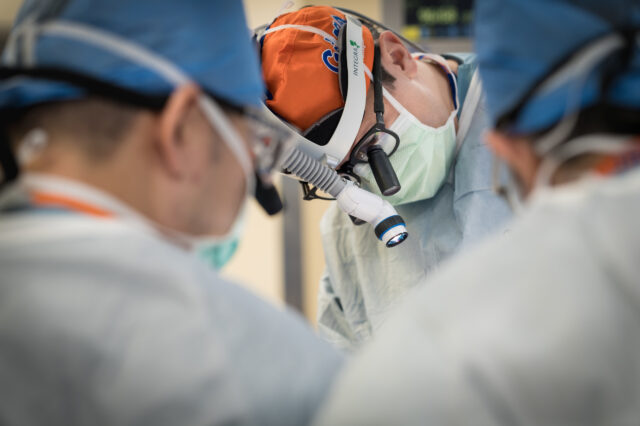The Scientific Registry of Transplant Recipients (SRTR) evaluates transplant centers in the United States. Data on patient volume and outcomes is sent to the Organ Procurement and Transplantation Network (OPTN). The OPTN runs the national transplant program.
SRTR supports the transplant community with analyses. Transplant centers can use this information to improve patient results and experiences. UF Health's achievements demonstrate our ability to provide transplants as a treatment for people with the most complex diagnoses.


UF Health - A Leader in Organ Transplantation
UF Health is the national leader for liver, kidney, and lung transplantation, based on data published by the Scientific Registry of Transplant Recipients.
We are the nation’s premier program for liver, kidney, and lung transplantation, as evidenced by data published by SRTR:
- Liver transplant outcomes: We are the No. 1 liver transplant program in the country. Not only do we transplant patients faster but also maintain the best one-year patient survival rate of 99.03%, compared to the national average of 93.71%.
- Kidney transplant outcomes: We are the No. 2 kidney transplant program in the country and the best in the Southeast. Our program outshines the national average for one-year graft survival and patient survival rates, while getting patients transplanted faster.
- Lung transplant outcomes: We are No. 1 in three-year patient survival, No. 4 in waitlist mortality and No. 8 in one-year patient survival out of 74 lung transplant programs in the country.
- Heart transplant outcomes: We continue to rank high among heart transplant programs, including one-year survival and survival on the waiting list.
- Heart–lung and kidney-pancreas transplant outcomes. We are among the few hospital that can perform multi-organ transplants. We are No. 9 for heart-lung and No. 13 for kidney-pancreas in the country.
How does SRTR rank transplant programs?
SRTR assesses outcomes for three metrics:
- Survival rate on the waiting list (pre-transplant mortality rate)
Measures how many patients died before undergoing a transplant relative to how many were expected to die
- Getting a transplant faster (transplant rate)
Measures the rate at which the program finds an organ donation for its candidates
- 1-year organ survival (first-year graft survival)
Measures the organs transplanted and the success rate
These five-tier outcome assessments are used to make it easier for the public to compare and understand the outcomes for transplant programs. These metrics are marked as most important:
Liver
- The primary sort tier is getting a transplant faster.
- The secondary tier is one-year survival, survival on the waiting list, deceased donor volume and living donor volume.
Kidney
- The primary sort tier is getting a transplant faster.
- The secondary tier is one-year survival, decreased donor volume and living donor volume.
Lung
- The primary sort tier is one-year survival.
- The secondary tier getting a transplant faster, survival on the waiting list and deceased donor volume.
Heart
- The primary sort tier is getting a transplant faster.
- The secondary sort order is one-year survival, survival on the waiting list and deceased donor volume.
Other organs
- The primary sort tier is deceased donor volume.
- The secondary tier is getting a transplant faster, one-year
